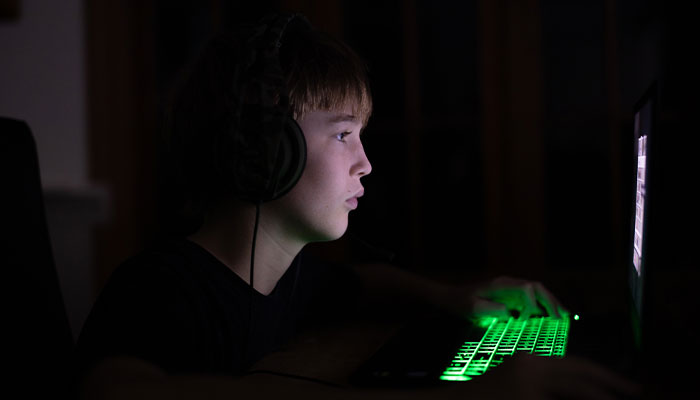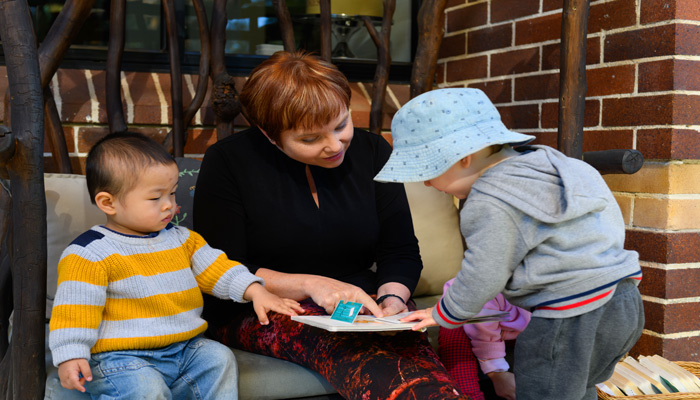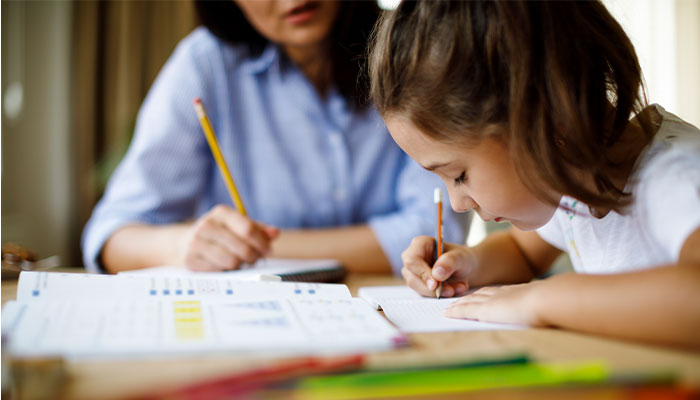A Macquarie University study of about 1000 Australian teenagers has found 2.8 per cent were affected by Internet Gaming Disorder, which has been included in the Diagnostic and Statistical Manual of Mental Disorders (DSM) since 2013.
Developmental Psychologist, Associate Professor Wayne Warburton, says to meet the criteria for Internet Gaming Disorder (IGD), video-game use must be having serious impacts across multiple areas of a young person’s life, such as schoolwork, relationships and mental health.
“A serious impact on a single area may indicate hazardous gaming (HG) behaviour, which may also require intervention,” he says.
How much is too much?
The recommended amount of recreational screen time varies for different age groups. For under-twos, for example, national guidelines recommend no screens.
“There’s no evidence such young children benefit even from educational media, so we should rethink handing our phones to babies and toddlers,” Warburton says.
“For those aged two to five, the recommendation is up to 45 minutes of educational media a day, like Playschool or Sesame Street, but it’s important that there’s an adult present to guide that viewing.
Think of a healthy media diet as being like a healthy food diet – it’s about moderation and good choices.
“For school-age kids, guidelines have been replaced by a recommendation to develop a family media plan, where you and your kids decide on limits together.
“It’s probably going to be more than the old recommendations of one hour a day during primary school and two in high school, but if you’re getting above three to four hours, then you’re running out of room for them to have a balanced life.
“Think of a healthy media diet as being like a healthy food diet – it’s about moderation and good choices.”
The warning signs
Warning signs of IGD for parents and carers include kids who are spending an increasing amount of time in their bedrooms, falling school grades, missing important activities, abandoning pastimes they used to enjoy, lying about how much time they are spending on gaming, and a shrinking circle of friends.

Perfect storm: Previously, teenagers were considered the most at-risk group for IGD, but primary school students may also be under threat.
They might be being tired and irritable, and find it hard not to game, possibly even becoming aggressive or violent if anyone tries to separate them from the screen.
While IGD and HG describe excessive use of video games, Warburton says psychologists see similar effects associated with addiction to the internet, social media, phones, and even pornography.
Who’s most at risk?
In 2015, US children aged 13-18 were already spending an average of six hours and 40 minutes a day on recreational screen use.
That rose to seven hours and 22 minutes in 2019, but the pandemic created a perfect storm and in 2021, it had leapt to eight hours and 39 minutes a day - and Warburton says there's every reason to believe the figures have seen a similar rise in Australia.
Previously, adolescents were considered the most at-risk group for IGD, but there are now indications primary students are also under threat.
- Light up your nightlife: Astronomy events still to come in 2022
- North Coast emus in dire need of a saviour
Warburton and Macquarie colleagues, Professor Maria Kangas and Brad Marshall, have published a series of case studies of children aged 11 to 13 who were addicted to games including Minecraft, Roblox, Fortnite, Call of Duty, or Counter Strike: Global Offensive, or to smart phones, social media, YouTube or streaming TV.
“Anyone can develop a screen addiction, but my research shows kids are more at risk if they have issues with impulse control and if their basic needs, like self-esteem, being included, feeling good at things and being in control, are being met better online than offline,” Warburton says.
The problem with screens
An excess of screen time cuts into sleep and pushes everything out of balance, Warburton says.

Off switch: Parents concerned about their children's screen use can consider making a family media plan.
“Online interaction doesn’t provide the same level of complex mental stimulation and physical contact as seeing friends in real life," he says.
“A lot of what we do in games and social media is repetitive, and doesn’t use a lot of brainpower. However, the brain is the ultimate use-it-or-lose-it organ. It changes second by second, and when we’re working it hard, the brain develops new connections to keep up. If it’s not being challenged, it may be losing connections.
“Just like unused muscles, the brain can atrophy – and this is visible in brain scans of heavy screen users.
“That would be a concern for people of any age, but it is particularly worrying for brains that are still developing.”
The devil is in the design
One of the key problems with video games and social media platforms is that many are based on an addiction model, says Warburton. This affects everyone, but young people who have yet to fully develop willpower and self-control are at particular risk. Teens with gaming addictions may also become addicted to gambling.
Dopamine motivates people to seek things they know are potentially pleasurable, but there is also a brake. When we feel satisfied, the brain releases gamma-aminobutyric acid and the contentedness hormone, serotonin, as a signal to stop.
It’s a ruthless and antisocial strategy that puts profits ahead of the welfare of our children.
Screen-based platforms are all dopamine and no brake, Warburton says. The anticipation of pleasure keeps us playing, scrolling or watching, but we are never fully satisfied and can find it hard to stop.
“This is a ‘persuasive design’ technique used by developers, along with features like easy use, autoplay, random rewards, and frequent prompts and triggers,” he says.
“Many platforms also use an artificial intelligence to create a ‘persuasion profile’ that identifies users’ vulnerabilities and produces an individualised program of content targeted toward them in real time.
- The science of letting go, for the sake of your hip pocket and the planet
- Single sex v co-ed: which is better for kids' education?
“They are all designed with the express purpose of keeping you at the screen as long as possible.
“Using an addiction model is a conscious choice. It’s the only way to drive profits because their competitors already use it.
“Many creators of online apps and games use neuroscience techniques to engage the brain's reward system and keep people at the screen.
“It’s a ruthless and antisocial strategy that puts profits ahead of the welfare of our children.”
Treating the problem
Problematic gaming behaviour can be treated, often through multi-modal psychological therapy; in severe cases it may also require medication.
“In treatment, we also look at which needs the screens are meeting and how they can be met in other ways. It’s important for children and teens to feel they have control of things off the screen, to have a sense of agency in their lives,” Warburton says.
Anyone concerned about their child’s screen use can begin by making a family media plan.
If this doesn’t help, seek advice from your GP, who can make a referral to a psychologist if needed.
Trialling a promising new program
Warburton and Dr Kerstin Paschke, from the University of Hamburg Medical Centre in Germany, are testing a new treatment program for problematic gaming.
“We’ve had excellent results from the Hamburg trial,” Warburton says.
Brain scans before and after treatment look promising. It seems likely we can actually reverse some problems caused by gaming disorders.
A trial begins on the Central Coast in mid-October, and families with eligible high-school-aged children are being invited to take part.
The program is free, but participants need to be able to travel to Wyong, and to commit to 13-16 sessions.
For further information, please email admin@resataus.com or wayne.warburton@mq.edu.au.

Associate Professor Wayne Warburton (pictured) is a registered psychologist and a researcher at Macquarie University’s School of Psychological Sciences.



